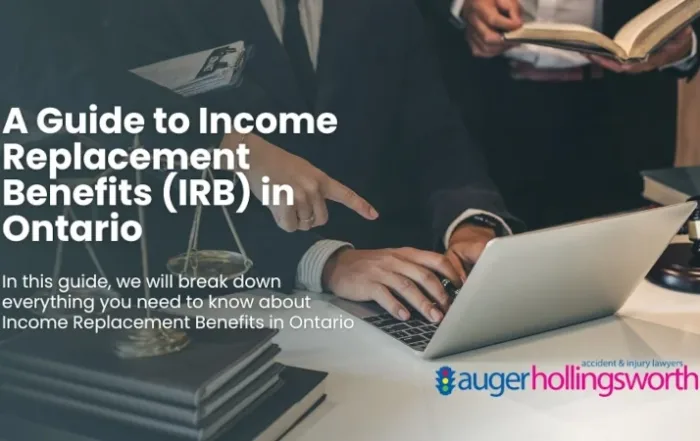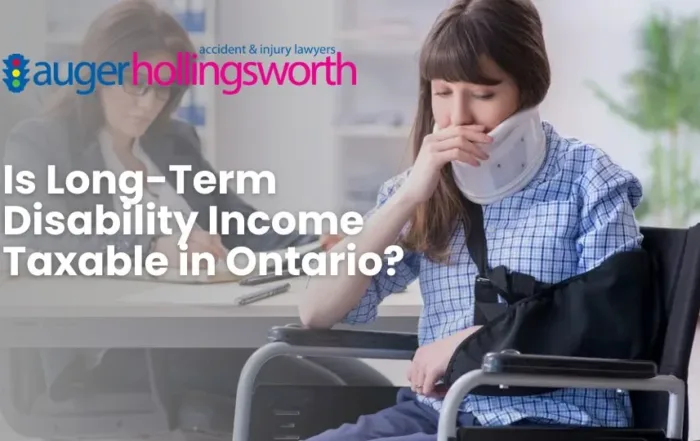The Road to Recovery by Brenda Hollingsworth and Richard Auger (2022)
For too long, the process of resolving a personal injury claim after a serious accident has been a deep, dark secret. It’s only become even more perplexing in recent years, as so-called settlement mill firms have moved into Ontario and started promoting the instant gratification of fast settlements.
Trying to figure out where to turn in the aftermath of an accident is likely to add to your pain and suffering—not bring you comfort.
All the noise about what you should do after an accident to protect your rights makes our heads hurt—and we’re not the injured ones trying to recover from a serious accident. This is why we wrote this book.
From our experience, we know there are barriers to this process, starting with that first call to a lawyer. We’ve also seen what clients go through daily as they struggle in the aftermath of an accident that changed their lives.
It’s no big deal to hire a lawyer.
The aftermath of an accident is more than any one person, or their family, should ever have to face. The trouble is: the suffering and frustration doesn’t stop with your physical or psychological injuries. There’s been at least one phone call from an aggressive insurance adjuster; other people involved in the accident are also calling. If the accident was a slip and fall, it may be a nervous store owner asking for a written statement— even though you thought you gave one.
Next, add on that “great” advice you’re getting from well-meaning friends and relatives. They aren’t experts, but that doesn’t stop them from giving you all kinds of ideas every time the topic of the accident is raised.
Press Pause
What we can tell you is that there are ways to get your life back—whether you’re the one who’s been badly hurt, or you’re close to someone in a rehabilitation facility or hospital undergoing treatment. But the process starts with something most people don’t want to think about, let alone talk about—calling a lawyer.
Calling a lawyer means entering a world that you don’t know or understand. At a time when you are dealing with everything from PTSD, anxiety, depression, anguish, fearfulness to issues with sleep and concentration, you certainly don’t need more complexity or unanswered questions in your life. Take a deep breath.
We are here to make things simple for you. Removing the mystery around what goes on in a law office by explaining what to expect goes a long way in making the whole process less ominous. Believe it or not, we are actual human beings doing our jobs and not slick hotshots like on TV.
What to expect when you make the call
When you call our office, you’ll talk with an experienced new-client intake member of our team. They’ll ask some general questions about the accident: the date, location, and a short explanation of what happened. The date is important because if there are time limits for taking certain steps (called “giving notice”), we may be able to help avoid missing a deadline that actually matters. They’ll also write down your injuries, medical care received to date, and work missed.
Assuming that we think we can help, the next step is a consultation with a lawyer. What to expect at that meeting and how to prepare for it is dealt with in Chapter 3. But let’s continue our sneak preview.
The first meeting is held at our office, or at a rehab facility or the hospital; sometimes, it’s on the phone or a virtual meeting. During the pandemic, we have met with and signed most new clients over Zoom. It has worked well, saving the injured person unnecessary travel and discomfort. Just think of it as a conversation where we ask about the accident and what caused it. We’ll want to find out about your injuries; the kind of medical attention you received, either at the scene or afterwards at the hospital; your treatments; and medical coverage.
You’ll have questions for us as well. Don’t hold back. There’s no judgment. You may not know your rights or what kind of compensation you deserve. That’s for us to figure out. And we will give you our honest opinion.
Hopefully by the end of that consultation, you’ll see that we’re not as scary as you may have feared—no five-syllable legal terms.
Want to read more? We’ll share another excerpt next month, or you can pre-order The Road To Recovery by emailing us at [email protected]
















